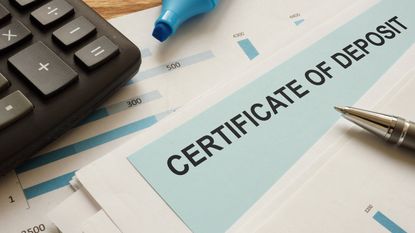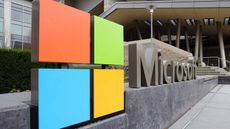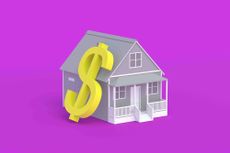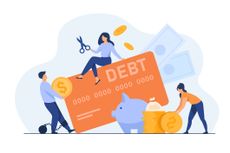1-Year CD Rates April 2023
High-yield 1-year CDs are growing in popularity. We look at the options on the market.
- (opens in new tab)
- (opens in new tab)
- (opens in new tab)
- Newsletter sign up Newsletter


Since last year, the Federal Reserve has continued to raise interest rates in an attempt to lower inflation, hiking the federal funds rate to a range of 4.75% to 5%. While these rate increases have driven mortgage rates to record highs and pushed many into credit card delinquency, there is one silver lining. Rates on savings accounts and CDs have also increased.
A CD, or certificate of deposit, is a type of investment account that holds a fixed amount of money for a fixed term — which can be anywhere from one year to five years. The annual percentage yield (APY) on CD accounts is typically higher than rates for traditional savings accounts, helping you maximize your savings with minimal effort.
Yields on CDs are expected to peak before leveling off later this year. Bankrate (opens in new tab) predicts that by the end of 2023, the national average for one-year CDs will increase to 1.8%.
However, if you look around you'll find many accounts are already offering much higher rates than that. In some cases, we've seen 1-year CDs with yields of more than 5%. Our tool, in partnership with Bankrate, will let you search for a good rate on an account that's right for you.
Why open a CD account?
One of the best reasons to open a CD account is that it’s one of the safest places you can save your cash. This is because most CD accounts are FDIC or NCUA insured. The difference depends on whether you open an account with a bank (overseen by the FDIC (opens in new tab)) or credit union (regulated by NCUA (opens in new tab)). If your bank or credit union is faced with any financial trouble or closes, your deposits will be insured up to $250,000 per account (and up to $250,000 per person in a joint account). You can even use the FDIC BankFind tool (opens in new tab) to check whether a bank is federally insured.
Opening a CD is also a great option if you’re looking for a guaranteed rate of return on your savings. While CDs offer comparatively lower returns compared to higher-risk investment options, like stocks or ETFs, they’re a good choice if you value a fixed, predictable and safe return on your money.
Here are some 1-year CDs with rates 5% and higher
These 1-year CD accounts currently offer some of the best rates on the market, with APYs of at least 5%.
BMO Harris
Term: 13 months
APY: 5.10%
Minimum Deposit: $1,000
CFG Bank
Term: 1 year
APY: 5.10%
Minimum Deposit: $500
Forbright
Term: 1 year
APY: 5.20%
Minimum Deposit: $1,000
State Bank of Texas
Term: 1 year
APY: 5.05%
Minimum Deposit: $100,000
USAlliance Financial
Term: 1 year
APY: 5.00%
Minimum Deposit: $500
Popular Direct
Term: 12 months
APY: 5.00%
Minimum Deposit: $10,000
Live Oak Bank
Term: 12 months
APY: 5.00%
Minimum Deposit: $2,500
CIBC Bank USA
Term: 12 months
APY: 5.02%
Minimum Deposit: $25,000
Bread Financial
Term: 12 months
APY: 5.05%
Minimum Deposit: $1,500
First Internet Bank of Indiana
Term: 12 months
APY: 5.06%
Minimum Deposit: $1,000
Related Content
- FDIC, NCUA and SIPC insurance — What Are the Limits?
- CD Rates Are Rising, Shop Around to Get the Best Returns
- Earn More with a CD Ladder
- The Advantages of Brokered CDs
- Will Savings Rates Go Up in 2023?

Erin pairs personal experience with research and is passionate about sharing personal finance advice with others. Previously, she was a freelancer focusing on the credit card side of finance, but has branched out since then to cover other aspects of personal finance. Erin is well-versed in traditional media with reporting, interviewing and research, as well as using graphic design and video and audio storytelling to share with her readers.
-
-
 Stock Market Today: Nasdaq Outperforms on Microsoft Earnings
Stock Market Today: Nasdaq Outperforms on Microsoft EarningsThe Nasdaq led in a mixed session for stocks Wednesday as Big Tech earnings impressed.
By Karee Venema • Published
-
 Did Tweets Help Crash Silicon Valley Bank? Paper Shows New Risks
Did Tweets Help Crash Silicon Valley Bank? Paper Shows New RisksA new study on Silicon Valley Bank's demise links depositor flight and stock crash with Twitter mentions.
By Ben Demers • Published
-
 Trusting Fintech: Four Critical Moves to Protect Yourself
Trusting Fintech: Four Critical Moves to Protect YourselfA few relatively easy steps can help you safeguard your money when using bank and budgeting apps and other financial technology.
By Shane W. Cummings, CFP®, AIF® • Published
-
 Four Steps to Prepare Your Finances for Divorce
Four Steps to Prepare Your Finances for DivorceDivorce is rarely easy, but getting financial paperwork in order, working with professionals and making tough decisions now can take some of the stress out of it.
By Marcy Keckler, CFP®, CRPC® • Published
-
 Mortgage Rates and Payments Keep Rising, Creating Market Misery
Mortgage Rates and Payments Keep Rising, Creating Market MiseryMortgages Current mortgage rates and payments continue to rise resulting in buyer demand stalling and housing sentiment at low levels.
By Erin Bendig • Published
-
 How to Open a Savings Account Online
How to Open a Savings Account OnlineYou may be wondering how to open a savings account online. The process is usually simple and straightforward — with just a few steps you’ll be able to start saving your hard-earned cash.
By Erin Bendig • Published
-
 CD Rates Are Rising, Shop Around to Get the Best Returns
CD Rates Are Rising, Shop Around to Get the Best ReturnsHigh-interest CD rates are back — shop around for the best 5%+ deals.
By Erin Bendig • Last updated
-
 U.S. Household Debt Hit a Record $16.90 Trillion in 2022
U.S. Household Debt Hit a Record $16.90 Trillion in 2022Household debt hit a record $16.90 trillion at the end of 2022, jumping $394 billion in the fourth quarter of the year alone.
By Erin Bendig • Published
-
 Want to Earn More Money? Consider These Five Ways
Want to Earn More Money? Consider These Five WaysInstead of simply vowing to save more money, why not commit to earning more? You could ask for a raise, try a side hustle or switch to a bank offering a higher savings rate.
By Erin Wood, CFP®, CRPC®, FBSⓇ • Published
-
 What Is a High-Yield Savings Account?
What Is a High-Yield Savings Account?A high-yield savings account is essentially the same as a traditional account with one key difference — they pay a higher than average APY on deposits.
By Erin Bendig • Last updated









